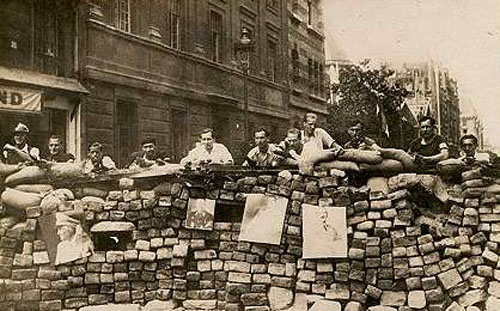Um excerto da palestra de Evan Calder Williams, "A Recusa da Cidade", no Maria Matos, esta terça feira.
"As for the barricade, we should start by noting that like sabotage, it's an interestingly neutral figure, despite its more obviousy revolutionary pedigree. Rhetorically, it appears in writing as that which the forces of reaction employ: “ But the first immediate barricade or the most advanced trench of the capitalist state is that of the apparatus and the leading organs of the major trade unions in nearly all the leading capitalist countries.” (Trotsky) The same, of course, is true of its material mobilizations: cops, armies, and all that falls between them barricade the city far more than we ever do.
Sabotage, in the tradition I stressed, seems rather opposed to the barricade: after all, the specificity of the sabotage noted in the syndicalist tradition was that which would allow you to keep up the illusion of things going fine, at most a sly smile, and then everything goes to shit. While, on the other hand, the barricade announces itself, not to mention standing – in the street, as well as the “radical imagination” - as the most explicit sign that shit is going down.
But the barricade and the blockade are not identical, however much they share a common function of interfering with circulation. For the specificity of the barricade is not that it blocks but that it is a sabotage of the city.
In the city, contrary to the wishes of those who live there, the primary concern is that of circulation itself: the city is a density of living and dead labor which must forever interpenetrate, transform, consume, and expel. It's on those grounds that it makes sense to see the metropolis as a form, rather than a bounded zone: massive as its towers of glass, steel, brick, and flesh may be, they are merely a built index of a juncture, a point through which the unlike gets itself commensurable.
That's why burning tires, the degree zero of the barricade, are so powerful: literally burning rubber, not to peel out, but to stop movement, such that the objects that ensure that food gets carried, work gets gone to, cement gets poured, and beers get drank, become the very objects that spew out their embedded toxicity and make other tires, and other possible passages in, out of, and through the city impossible. The barricade, then, is a sabotage of the city in a particular way: it ruins the city by using its materials against its function as a conduit of circulation, it wrecks the city in order to drive a wedge between what it is and what it is supposed to be, in the name of what it might be otherwise. In other words, it turns the materials of the space designated city against the figures of the polis and the attached forms of citizen, politics and civil society."

Sem comentários:
Enviar um comentário